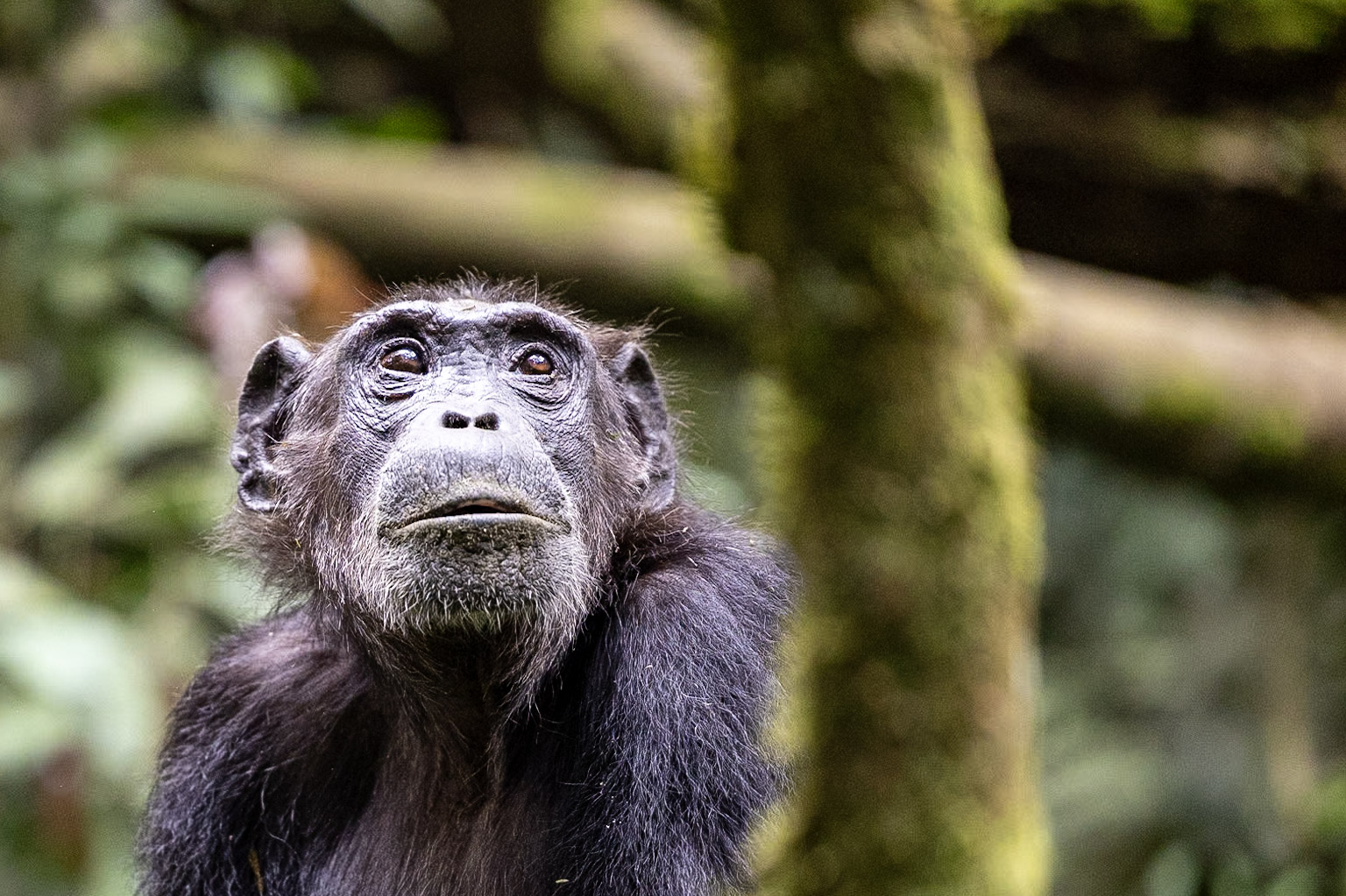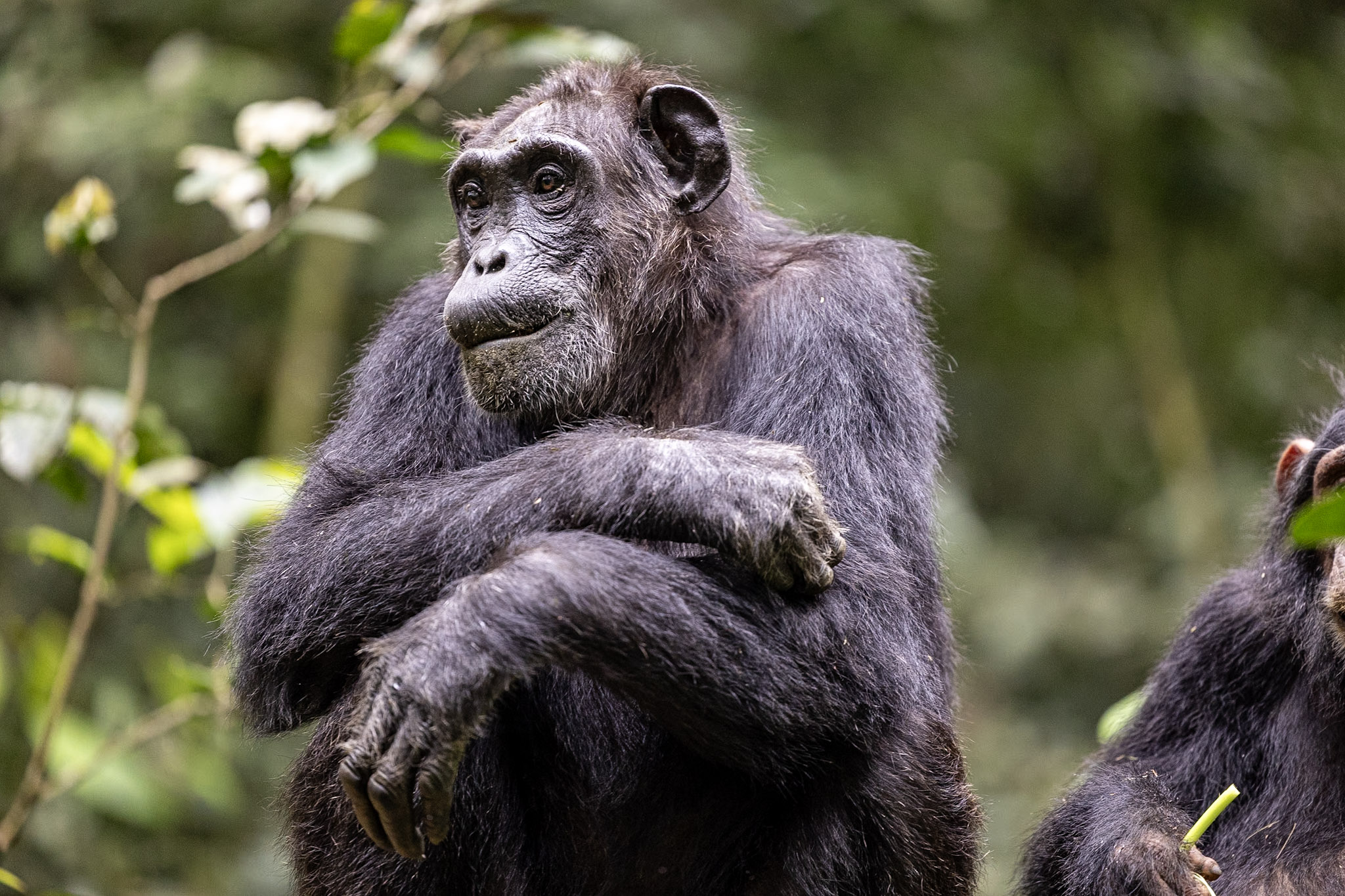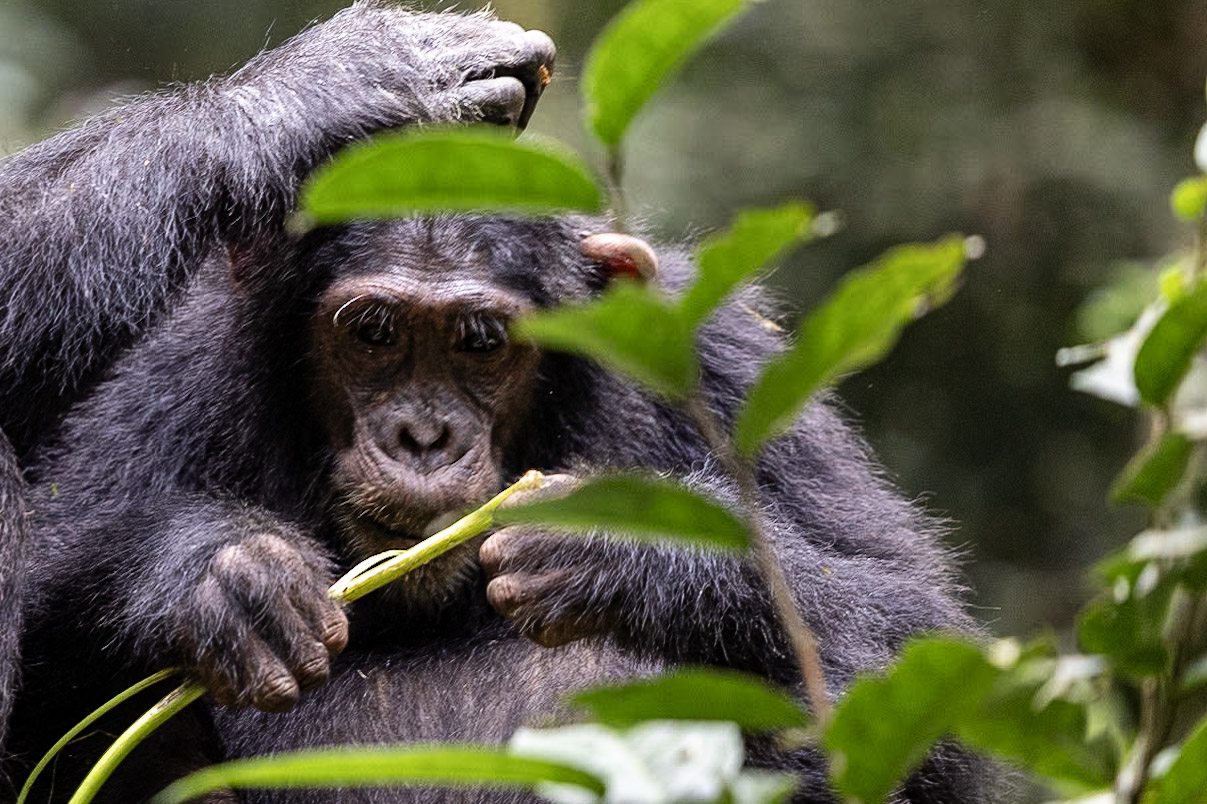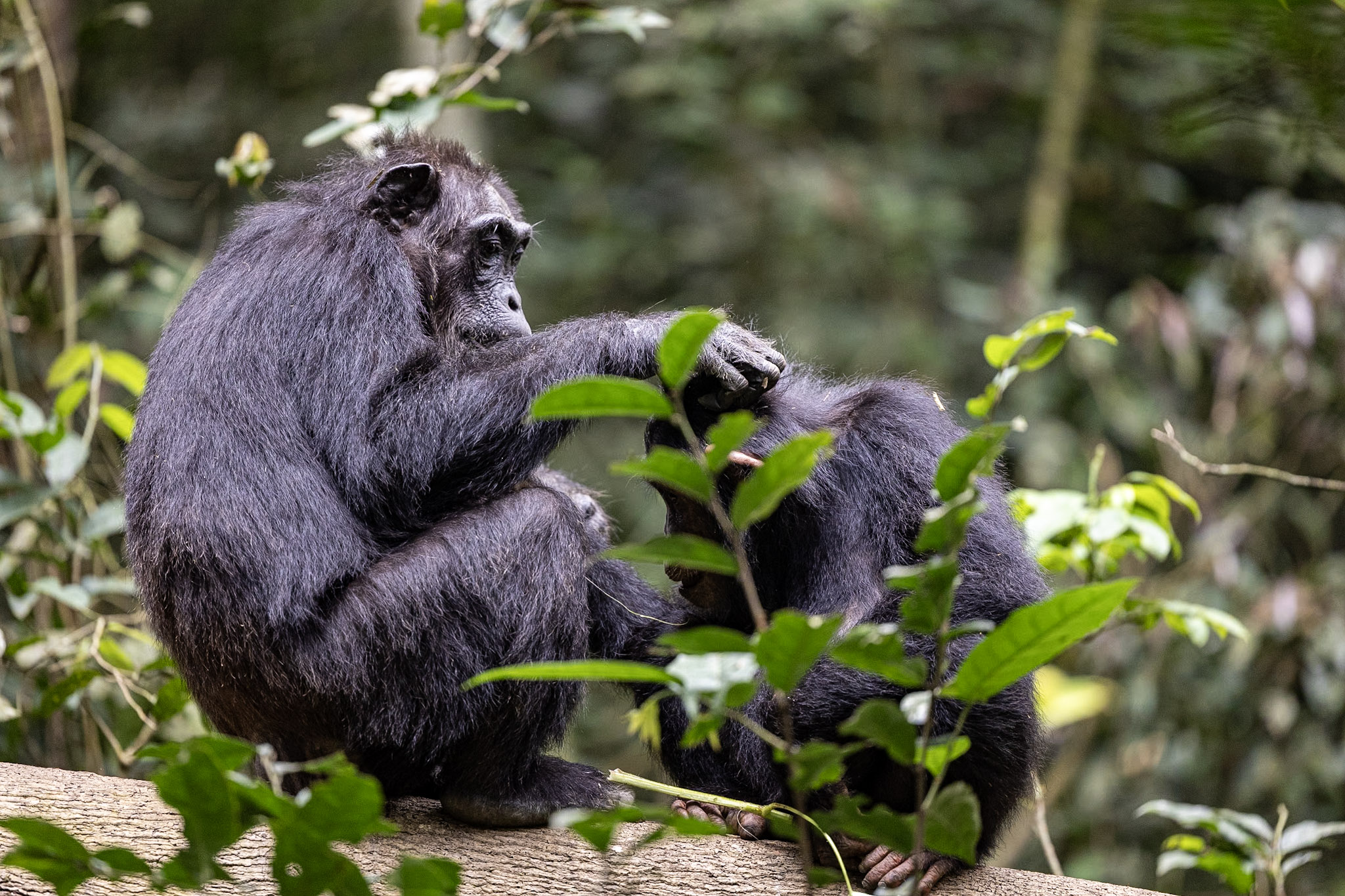Kibale Forest National Park Chimpanzee Trek and Travel Guide, Uganda Primates Tours and Safaris
Best Activities and Attractions to enjoy on a trip to Kibale Forest National Park in western Uganda, most popular for its population of chimpanzees and considered the best place to tour the wild chimpanzees on Earth. Chimpanzee trekking is the ultimate highlight for tourists who travel to Kibale Forest National Park. Over several years of conservation and habituation, the chance of seeing them has risen to over 95%.
Not only in Uganda but Kibale Forest National Park is one of the best safari destinations in Africa to tour chimpanzees for a trekking trip and as well Kibale Forest National Park has the highest number and diversity of primates to tour in East Africa. There are 13 species of primates including chimpanzees living within its 795 km2 land cover with the most beautiful and most diversified tracts of tropical forest in the whole of Uganda. The Forest cover predominates in the central and northern parts of the park on the raised Fort Portal plateau. At the park’s northern tip, Kibale is the highest and stands 1590m above sea level.

Location Of Kibale National Park:
The Location of Kibale National Park is in the western part of Uganda about 348km (5 hrs drive) from Kampala and about 26km south-east of the beautiful Fort Portal town – one of Uganda’s most lovely places to explore. The park is located close to the serene Ndali Kasenda crater area and it takes a half day’s drive to Queen Elizabeth National Park, Rwenzori Mountains & Semuliki National Parks, and the Toro-Semliki Wildlife Reserve.
Southern Kibale borders Queen Elizabeth National Park and collectively these conserved areas protect a 180 km long migration corridor for wildlife that stretches from the remote southern sector of Queen Elizabeth National Park in “Ishasha”, to “Sebitoli” in northern Kibale.
The scenery of Kibale National Park:
Kibale’s varied vegetation offers different varieties of wildlife habitat, ranging from the moist evergreen forest (wet tropical forest) along the Fort Portal plateau, then through the dry tropical forest (moist semi-deciduous), and then to the woodland and savanna along the rift valley floor. In the central part of the park, around Kanyanchu, the high forest consists of a mixture of evergreen trees and deciduous with the evergreen species being dominant.
The vegetation rises to over 55m and establishes a semi-closed canopy of massive stratified tree crowns. With shade-tolerant herbs, a variety of ferns, shrubs, and broad-leaved forest grasses, the undergrowth is sparse. 351 tree species have been registered in the park.

Wildlife in Kibale National Park:
Kibale is one of the best places in Africa to view many primate species. Visitors can expect to see five or six species in addition to chimpanzees. Species active during the day include vervet, red-tailed, l'Hoest's and blue monkey, black-and-white colobus, olive baboon, Ugandan red colobus, and Uganda mangabey.
Kibale Forest National Park provides refuge to the world’s largest population of the endangered red colobus monkey, and it is an important stronghold for Uganda mangabey, a rare national endemic (meaning it only occurs in Uganda).
Kibale is also home to many mammal species aside from primates, but they are rarely encountered. Elephants and buffalo roam the forest and other species present are giant forest hog, warthog, bushpig, bushbuck, and blue, red, and Peter's duiker.
Tourist Activities In Kibale National Park:
Chimpanzee Trekking and Habituation In Kibale National Park
The Kibale National Park is known for its chimpanzee tracking experiences. Guided tours allow visitors to observe the chimpanzees in their natural habitat, providing a unique and unforgettable experience. The Kanyanchu primate walk is a popular activity during which visitors can spot many of the primates that call this forest home such as chimpanzees and a variety of monkeys.
The full-day Chimpanzee Habituation Experience (CHEX) works with a chimp community that is undergoing habituation. Early morning visitors can watch chimps leaving their overnight nests between 6:00 and 6:30 am before feeding, copulating, hunting, breastfeeding, resting, patrolling, and displaying until it is time to build new nests around 7 pm.
Kibale Forest Hikes | Walking Trail:
The Kibale Forest walk trail is 12km long and the hike is usually done in the dry season from June to September and mid-November to February, taking between 5 and 6 hours. Hiking Tours offers you an opportunity to discover the park’s assorted habitats such as riverine forest, swamp, grassland, and tropical rainforest.

Bird Watching in Kibale National Park:
The park is home to 325 different bird species, including 6 that are native to the Albertine Rift area such as the dusky crimsonwing, black-capped apalis, blue-headed sunbird, collared apalis, red-faced woodland warbler, and purple-breasted sunbird.
Other Kibale specials are the green-breasted pitta, African pitta, black bee-eater, Abyssinian ground thrush, yellow spotted nicator, little greenbul, black-eared ground thrush, yellow rumped tinker bird, blue-breasted kingfisher, along with the crowned eagle.
The Bigodi nature walk offers the best bird-watching opportunities in the park as the swamp alone has approximately 138 bird species. It’s also famous for wildlife such as chimpanzees, red colobus, black and white colobus, red-tailed monkeys, bushbuck as well as mongoose.
Cultural tours in Kibale National Park:
Led by a local guide, you will get a chance to meet the native Batooro people as well as the Bakiga immigrants (from the densely populated southwestern part of Uganda) who stay around this park. During the Kibale Cultural Tours, you will visit a traditional village to see the traditional lifestyle of the locals such as visiting the local church, primary school, and traditional healer and getting a closer encounter with the natives. You will also enjoy some energetic traditional dances and songs by the Bakiga people.
Crater Lakes Tour in Kibale National Park:
The Kasenda area found in Fort Portal is home to more than 50 different crater lakes which are surrounded by steep-sided volcanoes. a visit to this picturesque area will allow you to appreciate the unique landscape of this area.
Nature walks in Kibale National Park:
The nature walk begins from Kanyanchu or Sebitoli and it takes about 2 to 6 days. The en route will help discover the forest and later rest in the community-run campsites close to the villages of Kikoni, Nyakalongo, and Nyaibanda.

Best Time to Visit Kibale National Park:
Although Kibale National Park is accessible throughout the year, the Best time to Visit the park is during the dry season when the trails are dry and passable. This runs from December to February and then from June to September. The wettest area in Kibale is the northern area, receiving an average annual rainfall of approximately 1700mm, mainly from March to May and September to November.
Where to stay in Kibale National Park:
There are different accommodations you will be staying at ranging from luxury to budget facilities among which are the Crater Safari Lodge, Isunga Lodge Kibale, Ndali Lodge, and Papaya Lake Lodge among others
How to Get To Kibale National Park:
By road:
Kibale National Park is easily accessible from Uganda’s capital, Kampala. This journey is about 6 hours with interesting landscapes, green countryside, traditional homesteads, tea plantations, and much more.
By air:
You can book a domestic flight which takes about 1 hour from Entebbe to Kasese Airstrip. This airstrip is only 1 hour away from the park.
You can also connect from other Ugandan national parks. There are daily scheduled flights from other parks such as Bwindi Impenetrable National Park, Semliki National Park, and Lake Mburo National Park.
Arrange and Book with Ultimate Wild Safaris for a tour of Kibale Forest National Park in western Uganda.
Email: This email address is being protected from spambots. You need JavaScript enabled to view it.
Mobile: +256 705 087 906 / 760 282 342

